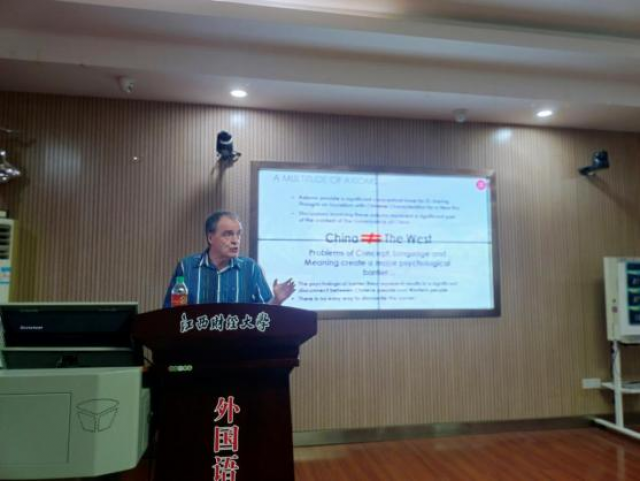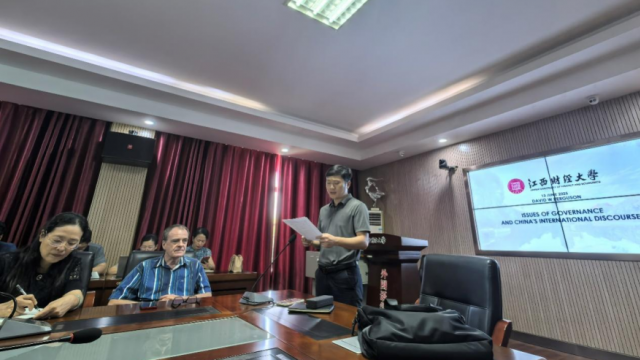June 13, 2024 – Jiangxi University of Finance and Economics (JUFE) hosted a significant academic event as the School of Foreign Languages welcomed Professor David W. Ferguson, Honorary Editor-in-Chief of Foreign Languages Press and multilingual expert, for his lecture “Issues of Governance and China’s International Discourse.” The Mailu Campus Y320 Hall gathering attracted many attendees including Dean Zhang Xifeng, Vice Deans Du Jingping and Zhang Shanjun, faculty members, and graduate students. 
Since 2008, Professor Ferguson has played a pivotal role in shaping China’s global narrative through his editorial leadership on key publications, notably serving as lead language editor for the English editions of Xi Jinping: The Governance of China (Volumes I-IV). His distinguished career includes receiving the Chinese Government Friendship Award and China Publishing Special Contribution Award, along with authoring eight books analyzing contemporary China and innovative educational materials like the children’s illustrated series Space Station Calder. The lecture systematically analyzed China’s governance philosophy and global communication strategies, tracing the evolution of political discourse reform from “Opposition to Party Jargon and Literary Style Reform” to Xi Jinping Thought on Socialism with Chinese Characteristics for a New Era. Professor Ferguson provided insightful comparisons between Chin’s development model and Western paradigms, examining modernization pathways, anti-corruption systems, and sustainable development frameworks while addressing demographic challenges such as population aging. “China’s governance system demonstrates unique institutional strengths that differ fundamentally from Western political models,” Ferguson asserted. He particularly emphasized the critical role of young translation scholars: “Linguistic excellence serves as our strategic asset in cross-cultural communication. We must cultivate this expertise to enhance China’s international discourse capabilities.” The subsequent discussion addressed pressing academic and professional concerns, including debates over theoretical frameworks in translation reports, solutions for innovation gaps in research, and strategies to improve employment outcomes for MTI graduates. Advocating practical approaches, Ferguson advised: “Translation’s core lies in achieving cultural transparency. Educational reforms should prioritize adaptable competencies, while students must systematically build expertise to contribute effectively to national discourse development.”  This intellectual exchange marked a milestone in JUFE’s academic programming, enabling direct engagement with global thought leaders and broadening perspectives on China’s governance modernization. The event reinforced the university’s commitment to nurturing talent capable of articulating China’s narrative in the global arena. As participants departed with enriched understanding, the School of Foreign Languages reaffirmed its dedication to equipping students with both theoretical knowledge and practical skills to advance China's global communication strategies in the new era. By Shi Liqin and Zhang Shanjun
|